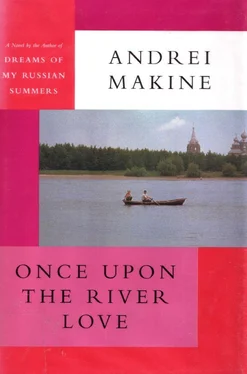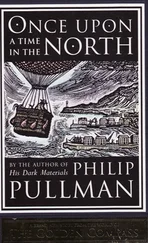In her black dress, she looks like a long bird's feather. Her face is pale, without a touch of makeup put on for local color.
Now, this machine, I think to myself, is really working well. Sasha knows just the right moment to serve up the Slavic charm… Their faces are softened by the abundance of food, their eyes misting over, their hearts melting…
But the song which arises does not seem to be playing Sasha's game. At first it is a very soft note, which immediately tempers the bravura of the musicians. A sound that seems to come from very far away and does not succeed in dominating the noise from the diners' tables. And if this frail voice imposes itself a few moments later, it is because everyone, despite drunkenness and a full stomach, can sense those distant snows unfolding, beyond the walls hung with red velvet and the paper icons. The voice is slightly raised; now the diners cannot take their eyes off the pale face, with its gaze lost in the mists of those days evoked by the song. In the illusory depths of the mirror I can probably see her better than the others. Her body a long black plume; her face without makeup, defenseless. She sings as if for herself; for that cold April night; for someone invisible. The way a woman sang one evening in front of the fire in a snowbound izba… Everyone knows the words by heart. Yet we find our way into that distant night, lost in a snowstorm, not by deciphering the words but by staring at the candle flame until it starts to grow bigger, letting you enter its transparent aura. And the music becomes the cool air of the izba, which smells of a snow squall; the radiant warmth of the fire; the scent of burning cedar; the limpid silence of solitude…
"That song," murmurs Utkin, "reminds me oddly of a story Samurai once told me. He was angry with himself for talking to me about the prisoners raped at the camp, and all that filth, even though I already knew about it. To him I was a child, and anyway, you know what Samurai was like… When the militiamen had gone off with the frozen prisoner and left us alone, Samurai pointed to his nose. You remember that boxer's nose he had? He told me how it happened."
That day, a thousand years ago, Samurai had gone to sleep on the roof of an abandoned barn near Kazhdai. The ground was still white, but the roof, under the spring sun, was shedding its last patches of melting snow. It was a woman's voice coming up from below that woke him. He looked down from the roof and saw three men setting upon a woman. She was struggling, but feebly – in our part of the world, as she well knew, slipping a knife between someone's ribs is easily done. From their shouts Samurai understood that it was not exactly a rape: the men simply did not want to pay. Otherwise she would have had nothing against it. In a word, she resigned herself… Samurai, tensed like a dog watching its prey observed them. The men uncovered only the parts of her body they were going to use: they bared her belly, uncovered her breasts, seized her chin, her mouth – they were going to need that. And all this in a hurry, panting, with dirty little laughs. Up there on the roof, nine feet above them, he was seeing for the first time in his life how a woman's body is prepared for "that."
The woman, split in two, closed her eyes. So as not to see… Dumbfounded, Samurai repressed an "Oh!" The woman had dropped her heart in the snow. No, it was doubtless a simple handkerchief or some small purchase wrapped in pale paper… It was a little pink parcel she was carrying in the inside pocket of the overcoat that the men had brutally ripped open at the collar… But for a moment Samurai thought he had seen a heart plunging into the snow. He began shouting and slid down from the roof, his face tortured by the evil that filled his eyes. He raised his arm-swords in the air and brought them down on the heads and ribs of his enemies. He crumpled under blows from fists as heavy as clubs. Then he got up again, wresting himself away from the hands that were trying to hold him fast. Suddenly blood flooded the sky. Blinded, he slashed with his swords, sometimes striking air, sometimes human flesh. But the blood that filled his eyes was slowly dissolving the sticky clot of evil… And when he was finally able to wipe his face with the sleeve of his jacket, he saw that the men were getting into a truck parked beside the road. And the woman, far away, very far away, was walking along beside the Olyei…
I listen to his story, and I believe I can recognize the Utkin of the old days. His face lights up. He is a heavy, corpulent man, but his gestures are once more reminiscent of the thrusts of a wounded bird trying to take flight from the earth. And it is in his old tones, grave and sorrowful, that he confides to me: "That woman, she was the red-haired prostitute who used to wait for the Transsiberian every evening. You remember?… The one I wrote my first poems to…
Utkin pours himself another glass, drinks it slowly. Has he even spoken? Or has that memory, buried beneath the snows, been born in my own fuddled head? And the blood flooding into Samurai's eyes, does it not have the warm smell of a forest in Central America? Samurai is stretched out at the foot of a tree, and what little vision he has left beneath the red flood conveys to him the image of two men in khaki approaching him cautiously. To finish him off. Yes, it is him that I see, his body riddled with metal, his smile defying the pain, true to the hero of our youth. To the one who taught us that bullets did not hurt and that death never came, so long as you looked it in the eye.
Stepping out of the heavy heat of the dining room, we pause for a moment on the boardwalk, before the somber expanse of the ocean. There is no light to be seen there. A dark infinity of water, snow, nothingness…
We end up at Georgi's, a tiny Georgian restaurant where life consists of long conversations with stray customers; views of the Black Sea on the walls; and the dreams of Kazbek, the old shepherd who welcomes us with his melancholy stare. Georgi greets us and brings us what he knows we need. Cognac, coffee, pieces of lime.
"In Tiflis a shell has destroyed my childhood home," he says softly, setting the bottle and the glasses on the table. "The world's going mad…"
We remain silent. We are seeing ourselves as we were twenty years earlier in the midst of an endless snow-covered plain… On the horizon the low sun of winter – that pendulum of history – was motionless, surrounded by watchtowers… We had then spent several years of our lives, Utkin, I, and so many others, stirring things up around that disk stuck in the barbed wire: writing our subversive books, debating, demonstrating. We pushed against its inert bulk with our shoulders – with our words! Gradually the pendulum of history had begun to respond to our efforts. It was swinging more and more freely, and now its movement back and forth across the immense empire was becoming threatening. One day that giddy swing had dragged us in its wake, flinging us beyond the frontiers of the empire onto the shores of our mythical Western World. And it was from these lands that we watched the pendulum gone crazy – or finally free? – demolishing the very empire itself… "And today, despite all my Western wisdom," I say to myself with a bitter smile, "I understand neither that frozen teardrop in the eye of the wolf they killed; nor the silent life beneath the bark of the ancient cedar tree that bears a great rusty nail in its trunk; nor the solitude of that red-haired woman, singing in front of the fire for someone invisible, in an izba entombed beneath the snow…" Utkin removes his glasses, and from the depths of his drunkenness he speaks slowly, focusing his blurred gaze on my face: "At the moment when I saw his name written in Roman script on the slab of his tomb – yes, his real name, not the 'Samurai' that we were so used to – well, at that moment I remembered everything. I remembered that day long ago, that walk with my grandfather on the banks of the Olyei… There was a path in the snow there, you remember. A narrow furrow that ran along the high ground beside the shore… I often tormented my grandfather with the embarrassing question: 'What do you have to do to write?' Maybe more that day than usual. I had just read his story about the war. And the silence of the taiga was more mysterious than ever. He replied with jokes or grinned and changed the subject. Finally, unable to stand it any more, he swore an oath and pushed my shoulder, playfully of course. I was up on the ridge, just near the icy slope that led down to the shore. I lost my balance and began sliding at full speed down that smooth strip. The sky revolved in front of my eyes; the wall of the taiga tumbled on top of me; I couldn't tell which was up and which was down. My body no longer had any weight – my fall had been so precipitous but at the same time gentle. Above all, I had this new sensation. Someone had pushed me as an equal, without worrying about my lame leg! I ended up down below, buried in a mass of snow amid some young pine trees. Dazzled and lighthearted, I looked around me. A few steps from my hillock, in the blue light of the winter evening, I saw them… Naked. A man and a woman. They were standing, close together, thigh pressed against thigh, their bodies entwined. They were gazing into each other's eyes without speaking. A perfect silence reigned. The purple sky above them… The smell of the snow and the pine resin… My mute presence… And these two bodies of an almost unreal beauty… My grandfather called me from the top of the ridge. His words rang out, breaking the silence. The two lovers unclasped each other and fled toward the little bathhouse izba… It was Samurai and a young woman I had never seen before and will never set eyes on again. As if she had been born in that moment of beauty and silence and vanished with it…"
Читать дальше












